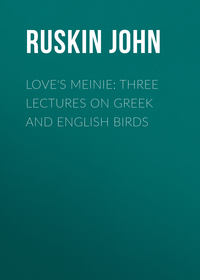
Hortus Inclusus
I am thankful, always, you like St. Ursula. One quite fixed plan for the last year of Fors, is that there shall be absolutely no abuse or controversy in it, but things which will either give pleasure or help; and some clear statements of principle, in language as temperate as hitherto violent; to show, for one thing, that the violence was not for want of self-command.
I'm going to have a good fling at the Bishops in next Fors to finish with, and then for January!—only I mustn't be too good, Susie, or something would happen to me. So I shall say naughty things still, but in the mildest way.
I am very grateful to you for that comparison about my mind being as crisp as a lettuce. I am so thankful you can feel that still. I was beginning to doubt, myself.
ST. MARK'S DOVES
Venice, 2d December (1876).
I have been very dismal lately. I hope the next captain of St. George's Company will be a merrier one and happier, in being of use. I am inherently selfish, and don't enjoy being of use. And here I've no Susies nor Kathleens nor Diddies, and I'm only doing lots of good, and I'm very miserable. I've been going late to bed too. I picked myself up last night and went to bed at nine, and feel cheerful enough to ask Susie how she does, and send her love from St. Mark's doves. They're really tiresome now, among one's feet in St. Mark's Place, and I don't know what it will come to. In old times, when there were not so many idlers about, the doves were used to brisk walkers, and moved away a foot or two in front of one; but now everybody lounges, or stands talking about the Government, and the doves won't stir till one just touches them; and I who walk fast 19 am always expecting to tread on them, and it's a nuisance.
If I only had time I would fain make friends with the sea-gulls, who would be quite like angels if they would only stop on one's balcony. If there were the least bit of truth in Darwinism, Venice would have had her own born sea-gulls by this time building their nests at her thresholds.
Venice, 11th December (1876).
My mouth's watering so for that Thwaite currant jelly, you can't think. I haven't had the least taste of anything of the sort this three months. These wretches of Venetians live on cigars and garlic, and have no taste in their mouths for anything that God makes nice.
The little drawing (returned) is nice in color and feeling, but, which surprises me, not at all intelligent in line. It is not weakness of hand but fault of perspective instinct, which spoils so many otherwise good botanical drawings.
Bright morning. Sickle moon just hiding in a red cloud, and the morning stars just vanished in light. But we've had nearly three weeks of dark weather, so we mustn't think it poor Coniston's fault—though Coniston has faults.
ST. MARK'S REST
23d January, 1877.
A great many lovely things happened to me this Christmas, but if I were to tell Susie of them I am sure she would be frightened out of her bright little wits, and think I was going to be a Roman Catholic. I'm writing such a Catholic history of Venice, and chiseling all the Protestantism off the old "Stones" as they do here the grass off steps.
All the pigeons of St. Mark's Place send you their love. St. Ursula adds hers to the eleven thousand birds' love. And the darlingest old Pope who went a pilgrimage with her, hopes you won't be too much shocked if he sends his too! (If you're not shocked, I am!)
My new Catholic history of Venice is to be called "St. Mark's Rest."
27th January (1877).
Joanie tells me you are writing her such sad little letters. How can it be that any one so good and true as my Susie should be sad? I am sad, bitterly enough and often, but only with sense of fault and folly and lost opportunity such as you have never fallen into or lost. It is very cruel of Fate, I think, to make us sad, who would fain see everybody cheerful, and (cruel of Fate too) to make so many cheerful who make others wretched. The little history of Venice is well on, and will be clear and interesting, I think,—more than most histories of anything. And the stories of saints and nice people will be plenty.
Such moonlight as there is to-night, but nothing to what it is at Coniston! It makes the lagoon water look brown instead of green, which I never noticed before.
Venice, 4th February, 1877.
Your praise and sympathy do me double good, because you could not praise me so nicely and brightly without pleasure of your own. I'm always sure a Fors will be good if I feel it will please Susie;—but I can only write them now as they're given me; it all depends on what I'm about. But I'm doing a great deal just now which you will enjoy—I'm thankful to say, I know you will. St. Theodore's horse is delightful 20 —and our Venetian doggie—and some birds are coming too! This is not a letter—but just a purr.
SAINTS AND FLOWERS
Venice, 17th February (1877).
It is very grievous to me to hear of your being in that woeful weather while I have two days' sunshine out of three, and starlight or moonlight always; to-day the whole chain of the Alps from Vicenza to Trieste shining cloudless all day long, and the sea-gulls floating high in the blue, like little dazzling boys' kites.
Yes, St. Francis would have been greatly pleased with you watching pussy drink your milk; so would St. Theodore, as you will see by next Fors, which I have ordered to be sent you in first proof, for I am eager that you should have it. What wonderful flowers these pinks of St. Ursula's are, for life! They seem to bloom like everlastings.
I get my first rosebud and violets of this year from St. Helena's Island to-day. How I begin to pity people who have no saints to be good to them! Who is yours at Coniston? There must have been some in the country once upon a time.
With their help I am really getting well on with my history and drawing, and hope for a sweet time at home in the heathery days, and many a nice afternoon tea at the Thwaite.
Venice, 8th March, 1877.
That is entirely new and wonderful to me about the singing mouse. 21 Douglas (was it the Douglas?) saying "he had rather hear the lark sing than the mouse squeak" needs revision. It is a marvelous fact in natural history.
The wind is singing a wild tune to-night—cannot be colder on our own heaths—and the waves dash like our Waterhead. Oh me, when I'm walking round it again how like a sad dream all this Venice will be!
Venice, 15th May, 1877.
I've not tumbled into the lagoons, nor choked myself in a passion, nor gone and made a monk of myself—nor got poisoned by the Italian cooks.
I'm packing up, and coming to the Thwaite as soon as ever I can—after a little Alpine breathing of high air.
I'm pretty well—if you'll forgive me for being so naughty—else I can't be even plain well—but I'm always your loving–
[Transcriber's Note: no ending to the sentence here.]
Oxford, 2d December (1877).
I write first to you this morning to tell you that I gave yesterday the twelfth and last 22 of my course of lectures this term, to a room crowded by six hundred people, two-thirds members of the University, and with its door wedged open by those who could not get in; this interest of theirs being granted to me, I doubt not, because for the first time in Oxford, I have been able to speak to them boldly of immortal life. I intended when I began the course only to have read "Modern Painters" to them; but when I began, some of your favorite bits interested the men so much, and brought so much larger a proportion of undergraduates than usual, that I took pains to reinforce and press them home; and people say I have never given so useful a course yet. But it has taken all my time and strength, and I have not been able even to tell Susie a word about it until now. In one of my lectures I made my text your pretty peacock and the design 23 of him. But did not venture to say what really must be true, that his voice is an example of "the Devil sowed tares," and of the angels letting both grow together. My grateful compliments to the peacock. And little (but warm) loves to all your little birds. And best of little loves to the squirrels, only you must send them in dream-words, I suppose, up to their nests.
Herne Hill,
Sunday, 16th December (1877).
It is a long while since I've felt so good for nothing as I do this morning. My very wristbands curl up in a dog's-eared and disconsolate manner; my little room is all a heap of disorder. I've got a hoarseness and wheezing and sneezing and coughing and choking. I can't speak and I can't think, I'm miserable in bed and useless out of it; and it seems to me as if I could never venture to open a window or go out of a door any more. I have the dimmest sort of diabolical pleasure in thinking how miserable I shall make Susie by telling her all this; but in other respects I seem entirely devoid of all moral sentiments. I have arrived at this state of things, first by catching cold, and since by trying to "amuse myself" for three days. I tried to read "Pickwick," but found that vulgar, 24 and, besides, I know it all by heart. I sent from town for some chivalric romances, but found them immeasurably stupid. I made Baxter read me the Daily Telegraph, and found that the Home Secretary had been making an absurd speech about art, without any consciousness that such a person as I had ever existed. I read a lot of games of chess out of Mr. Staunton's handbook, and couldn't understand any of them. I analyzed the Dock Company's bill of charges on a box from Venice, and sent them an examination paper on it. I think that did amuse me a little, but the account doesn't. £1 8s. 6d. for bringing a box two feet square from the Tower Wharf to here! But the worst of all is, that the doctor keeps me shut up here, and I can't get my business done; and now there isn't the least chance of my getting down to Brantwood for Christmas, nor, as far as I can see, for a fortnight after it. There's perhaps a little of the diabolical enjoyment again in that estimate; but really the days do go, more like dew shaken off branches than real sunrisings and settings. But I'll send you word every day now for a little while how things are going on.
Corpus Christi College, Oxford,
26th December, 1877.
I don't know really whether I ought to be at Brantwood or here on Christmas. Yesterday I had two lovely services in my own cathedral. You know the cathedral of Oxford is the chapel of Christ Church College, and I have my own high seat in the chancel, as an honorary student, besides being bred there, and so one is ever so proud and ever so pious all at once, which is ever so nice, you know; and my own dean, that's the Dean of Christ's Church, who is as big as any bishop, read the services, and the psalms and anthems were lovely; and then I dined with Henry Acland and his family, where I am an adopted son,—all the more wanted yesterday because the favorite son Herbert died this year in Ceylon,—the first death out of seven sons. So they were glad to have me. Then I've all my Turners here, and shall really enjoy myself a little to-day, I think; but I do wish I could be at Brantwood too.
Oh dear, I've scribbled this dreadfully. Can you really read my scribble, Susie? Love, you may always read, however scribbled.
Oxford, 27th December, 1877.
By the way, what a shame it is that we keep that word "jealous" in the second commandment, as if it meant that God was jealous of images. It means burning, zealous or full of life, visiting, etc., i.e., necessarily when leaving the father leaving the child; necessarily, when giving the father life, giving life to the child, and to thousands of the race of them that love me.
It is very comic the way people have of being so particular about the second and fourth commandments, and breaking all the rest with the greatest comfort. For me, I try to keep all the rest rather carefully, and let the second and fourth take care of themselves.
Cold quite gone; now it's your turn, Susie. I've got a love letter in Chinese, and can't read it!
Windsor Castle,
2d January, 1878.
I'm horribly sulky this morning, for I expected to have a room with a view, if the room was ever so little, and I've got a great big one looking into the Castle yard, and I feel exactly as if I was in a big modern county jail with beautiful turrets of modern Gothic.
I came to see Prince Leopold, who has been a prisoner to his sofa lately, but I trust he is better; he is very bright and gentle, under severe and almost continual pain. My dear little Susie, about that rheumatism of yours? If it wasn't for that, how happy we both ought to be, living in Thwaites and woods, instead of nasty castles! Well, about that Shakespeare guide? I cannot, cannot, at all fancy what it is. In and out among the stars; it sounds like a plan for stringing the stars. I am so very glad you told me of it.
"Unwritten books in my brain?" Yes, but also in how many other brains of quiet people, books unthought of, "In the Book and Volume" which will be read some day in Heaven, aloud, "When saw we thee?" Yes, and "When read we ourselves?"
My dear Susie, if I were to think really lost, what you for instance have new found in your own powers of receiving and giving pleasure, the beautiful faculties you have, scarcely venturing even to show the consciousness of them, when it awakes in you, what a woeful conception I should have of God's not caring for us. He will gather all the wheat into His garner.
Ingleton, 17th January (1878).
It's a charming post here, and brings me my letters the first thing in the morning; and I took care to tell nobody where I was going, except people I wanted to hear from. What a little busy bee of a Susie you've been to get all those extracts ready by this time. I've got nothing done all the while I've been away, but a few mathematical figures, and the less I do the less I find I can do it; and yesterday, for the first time these twenty years at least, I hadn't so much as a "plan" in my head all day. But I had a lot to look at in the moorland flowers and quiet little ancient Yorkshire farmhouses, not to speak of Ingleborough, who was, I think, a little depressed because he knew you were only going to send your remembrances and not your love to him. The clouds gathered on his brow occasionally in a fretful manner, but towards evening he resumed his peace of mind and sends you his "remembrances" and his "blessing." I believe he saves both you and me from a great deal of east wind.
Well, I've got a plan in my head this morning for the new extracts. Shall we call them "Lapides (or "Marmora") Portici"; and put a little preface to them about the pavement of St. Mark's porch and its symbolism of what the education of a good man's early days must be to him? I think I can write something a little true and trustworthy about it.
26th November.
I have entirely resigned all hope of ever thanking you rightly for bread, sweet odors, roses and pearls, and must just allow myself to be fed, scented, rose-garlanded and bepearled as if I were a poor little pet dog or pet pig. But my cold is better, and I am getting on with this botany; but it is really too important a work to be pushed for a week or a fortnight. And Mary and you will be pleased at last, I am sure.
I have only to-day got my four families, Clarissa, Lychnis, Scintilla, and Mica, perfectly and simply defined. 25 See how nicely they come.
A. Clarissa changed from Dianthus, which is bad Greek (and all my pretty flowers have names of girls). Petal jagged at the outside.
B. Lychnis. Petal divided in two at the outside, and the fringe retired to the top of the limb.
C. Scintilla. (Changed from Stellaria, because I want Stella for the house leeks.) Petal formed by the two lobes of lychnis without the retired fringe.
D. Mica. Single lobed petal.
When once these four families are well understood in typical examples, how easy it will be to attach either subordinate groups or specialities of habitat, as in America, to some kinds of them! The entire order, for their purity and wildness, are to be named, from Artemis, "Artemides", instead of Caryophyllaceæ; and next them come the Vestals (mints, lavenders, etc.); and then the Cytheride Viola, Veronica, Giulietta, the last changed from Polygala.
That third Herb Robert one is just the drawing that nobody but me (never mind grammar) could have made. Nobody! because it means ever so much careful watching of the ways of the leaf, and a lot of work in cramp perspective besides. It is not quite right yet, but it is nice.
It is so nice to be able to find anything that is in the least new to you, and interesting; my rocks are quite proud of rooting that little saxifrage.
I'm scarcely able to look at one flower because of the two on each side, in my garden just now. I want to have bees' eyes, there are so many lovely things.
I must tell you, interrupting my botanical work this morning, something that has just chanced to me.
I am arranging the caryophylls, which I mass broadly into "Clarissa," the true jagged-leaved and clove-scented ones; "Lychnis," those whose leaves are essentially in two lobes; "Arenaria," which I leave untouched; and "Mica," a new name of my own for the pearlworts of which the French name is to be Miette, and the representative type (now Sagina procumbens) is to be in—
Latin– Mica amica.
French– Miette l'amie.
English– Pet pearlwort.
Then the next to this is to be—
Latin– Mica millegrana.
French– Miette aux mille perles.
English– Thousand pearls.
Now this on the whole I consider the prettiest of the group, and so look for a plate of it which I can copy. Hunting all through my botanical books, I find the best of all is Baxter's Oxford one, and determine at once to engrave that. When turning the page of his text I find: "The specimen of this curious and interesting little plant from which the accompanying drawing was made was communicated to me by Miss Susan Beever. To the kindness of this young lady, and that of her sister, Miss Mary Beever, I am indebted for the four plants figured in this number."
I have copied lest you should have trouble in looking for the book, but now, you darling Susie, please tell me whether I may not separate these lovely pearlworts wholly from the spergulas,—by the pearlworts having only two leaves like real pinks at the joints, and the spergulas, a cluster; and tell me how the spergulas scatter their seeds, I can't find any account of it.
I would fain have come to see that St. Bruno lily; but if I don't come to see Susie and you, be sure I am able to come to see nothing. At present I am very deeply involved in the classification of the minerals in the Sheffield Museum, important as the first practical arrangement ever yet attempted for popular teaching, and this with my other work makes me fit for nothing in the afternoon but wood-chopping. But I will call to-day on Dr. Brown's friends.
I hope you will not be too much shocked with the audacities of the new number 26 of "Proserpina", or with its ignorances. I am going during my wood-chopping really to ascertain in my own way what simple persons ought to know about tree growth, and give it clearly in the next number. I meant to do the whole book very differently, but can only now give the fragmentary pieces as they chance to come, or it would never be done at all.
You must know before anybody else how the exogens are to be completely divided. I keep the four great useful groups, mallow, geranium, mint, and wallflower, under the head of domestic orders, that their sweet service and companionship with us may be understood; then the water-lily and the heath, both four foils, are to be studied in their solitudes (I shall throw all that are not four foils out of the Ericaceæ); then finally there are to be seven orders of the dark proserpine, headed by the draconids (snapdragons), and including the anemones, hellebores, ivies, and forget-me-nots.
What plants I cannot get ranged under these 12+4+2+7==25 in all, orders, I shall give broken notices of, as I have time, leaving my pupils to arrange them as they like. I can't do it all.
The whole household was out after breakfast to-day to the top of the moor to plant cranberries; and we squeezed and splashed and spluttered in the boggiest places the lovely sunshine had left, till we found places squashy and squeezy enough to please the most particular and coolest of cranberry minds; and then each of us choosing a little special bed of bog, the tufts were deeply put in with every manner of tacit benediction, such as might befit a bog and a berry, and many an expressed thanksgiving to Susie and to the kind sender of the luxuriant plants. I have never had gift from you, dear Susie, more truly interesting and gladdening to me, and many a day I shall climb the moor to see the fate of the plants and look across to the Thwaite. I've been out most of the forenoon and am too sleepy to shape letters, but will try and get a word of thanks to the far finder of the dainty things to-morrow.
What loveliness everywhere in a duckling sort of state just now.
Brantwood.
I hope you did not get a chill in the garden. The weather is a little wrong again, but I am thankful for last night's sunset.
You know our English Bible is only of James 1st time—Stalk is a Saxon word, and gets into English I fancy as early as the Plantagenets—but I have not hunted it down.—I'm just in the same mess with "pith," but I'm finding out a great deal about the thing though not the word, for next "Deucalion," in chopping my wood.
You know, "Funckia" won't last long. I am certain I shall have strength enough to carry my system of nomenclature at least as far, as to exclude people's individual names.
I won't even have a "Susia"—stay—that's Christian—yes, I will have a Susia. But not a "Beeveria," though–
TO MISS BEEVER
20th January, 1879.
You will not doubt the extreme sorrow with which I have heard of all that was ordered to be, of terrible, in your peaceful and happy household. Without for an instant supposing, but, on the contrary, utterly refusing to admit, that such calamities 27 may be used to point a moral (all useful morality having every point that God meant it to have, perfectly sharp and bright without any burnishing of ours), still less to adorn a tale (the tales of modern days depending far too much upon Scythian decoration with Death's heads), I, yet, if I had been Mr. Chapman, would have pointed out that all concealments, even of trivial matters, on the part of young servants from kind mistresses, are dangerous no less than unkind and ungenerous, and that a great deal of preaching respecting the evil nature of man and the anger of God might be spared, if children and servants were only taught, as a religious principle, to tell their mothers and mistresses, when they go out, exactly where they are going and what they are going to do. I think both you and Miss Susan ought to use every possible means of changing, or at least checking, the current of such thoughts in your minds; and I am in hopes that you may have a little pleasure in examining the plates in the volume of Sibthorpe's "F. Græca" which I send to-day, in comparison with those of "F. Danica." The vulgarity and lifelessness of Sibthorpe's plates are the more striking because in mere execution they are the more elaborate of the two; the chief point in the "F. Danica" being the lovely artistic skill. The drawings for Sibthorpe, by a young German, were as exquisite as the Dane's, but the English engraver and colorist spoiled all.
I will send you, if you like them, the other volumes in succession. I find immense interest in comparing the Greek and Danish forms or conditions of the same English flower.
I send the second volume, in which the Rufias are lovely, and scarcely come under my above condemnation. The first is nearly all of grass.
Brantwood, 4th February (1879).
You know I'm getting my Oxford minerals gradually to Brantwood, and whenever a box comes, I think whether there are any that I don't want myself, which might yet have leave to live on Susie's table. And to-day I've found a very soft purple agate, that looks as if it were nearly melted away with pity for birds and flies, which is like Susie; and another piece of hard wooden agate with only a little ragged sky of blue here and there, which is like me; and a group of crystals with grass of Epidote inside, which is like what my own little cascade has been all the winter by the garden side; and so I've had them all packed up, and I hope you will let them live at the Thwaite.









